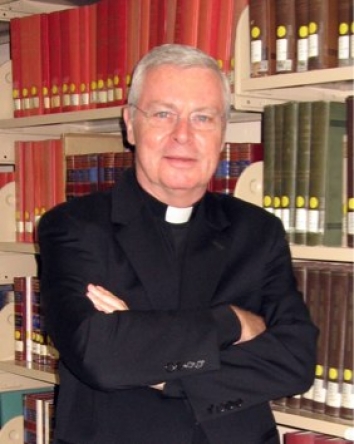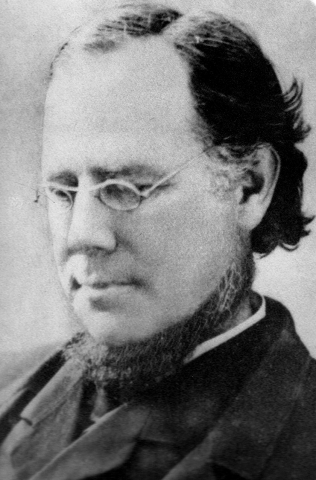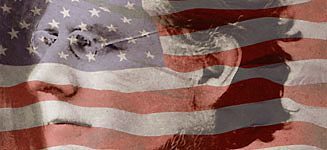July 2, 2012

Paulist historian Father Paul G. Robichaud, CSP
The founder of the Paulist Fathers – Servant of God Father Isaac T. Hecker – was politically active as a young man living in New York City in the late 19th century. After a lot of searching, a young Isaac Hecker found his calling as a Catholic priest. As an American convert to the Catholic faith, and in an age of anti-Catholic politics, Father Hecker differed from many in his generation in his belief that American democracy and the Catholic faith were a perfect marriage.
“The conviction is increasing among its more enlightened citizens that the Catholic religion alone is able to give unity to a people occupying so vast an extent of territory, embracing such a diversified population and of such variety and ever conflicting interests,” Father Hecker wrote.
As we celebrate the founding of the United States on July 4, Paulist historian Father Paul Robichaud, CSP answers questions on how Father Hecker viewed the symbiosis of democracy and the church, and how that relationship is played out today in light of the U.S. Bishops’ Fortnight for Freedom.
Why did Father Hecker view the Declaration of Independence as a turning point in world history?
The Declaration announced that people had the natural rights of life, liberty and the pursuit of happiness, and to form a government based on these natural rights was for Father Hecker a turning point in world history. Hecker believed that these rights derived from the dignity of humankind found in the teaching of the Roman Catholic Church. Hecker believed therefore that the Catholic faith was the best potential fit with a developing America based on a belief in the goodness of human beings and their rights and freedoms.

Father Isaac Hecker, CSP
How did Hecker compare the Declaration of Independence to the Magna Carta?
For Hecker, what preceded the Declaration of Independence was the Magna Carta of 1215. Here in English history the power of the king was restricted for the first time and the rights of “free men” were protected. The English barons required King John to grant certain liberties and rights. As a result of the Magna Carta, for example, no free man could be punished without a trial.
But where is the connection between church and state with the Magna Carta?
The Magna Carta came about with the critical support of Cardinal Stephen Langton, the Archbishop of Canterbury and the Catholic bishops of England. Like the Declaration of Independence, this earlier moment of the origins of English law derives from Catholic teaching. Father Hecker liked to remind Americans that the Magna Carta was a Catholic moment and a part of our Catholic history. Hecker saw in the Declaration of Independence a continuation of the Catholic tradition of celebrating freedom and natural rights.
How does Father Hecker connect the concepts of freedom and liberty to Catholic theology?
Sin came into the world with Adam, but the Catholic Church teaches baptism takes away original sin and restores the rights and freedoms of the children of God. Hecker would compare this restored view of humankind with John Calvin’s view of humankind as broken and not free. Hecker could never understand how Americans could embrace a form of Christianity that denied rather than upheld our freedom and natural rights. That is why Hecker thought the Catholic faith was such a good fit for America as it celebrates the freedom of individuals and the institutions and communities that they create.
What about the Protestant-Catholic intolerance that existed through the first decades of America?
Hecker believed that many American Christians in his own time had moved away from intolerant views of Puritans who settled in New England. He liked to remind his fellow Americans that in contrast to the Puritans, the first Catholic settlers practiced religious tolerance. Cecil Calvert, the second Lord Baltimore, was a Catholic and English nobleman who became the first royal governor of Maryland. Maryland then became a safe haven for Catholics – who were under heavy persecution in England – and all those who wanted to worship according to their conscience. In fact, two Jesuit priests were among the almost 200 passengers who sailed from England in two ships called The Ark and The Dove and landed at St. Clement’s Island [named for Pope St. Clement I] in southern Maryland. The settlers were equally Catholic and Protestant, and Lord Baltimore handed down strict guidelines that religious tolerance should be observed in his colony.
How does this history and Hecker’s beliefs fit in with the U.S. Bishops’ Fortnight for Freedom?
Our First, Most Cherished Liberty: A Statement of Religious Liberty from the U.S. Bishops begins with: “We are Catholics. We are Americans. We are proud to be both…” That is something Isaac Hecker would have said. The bishops also state: “To be Catholic and American should mean not having to choose one over the other. Our allegiances are distinct, but they need not be contradictory, and should instead be complementary.” Again that is classic Isaac Hecker.
What is at stake with the Bishops’ statement and the current controversy over government mandates?
It is very difficult to be a non-profit organization – especially a school or hospital – and not have some connection to the government, even if it is the form of a scholarship or accepting Medicare or Medicaid. The government claims that when we partner with them we have to abide by their regulations. But there is a long tradition of religious exemption in our country to respect our religious teaching and Catholic institutions want exemptions to some of the government regulations in that light.
What issues are we speaking of?
Catholic medical facilities could be forced to provide contraceptive, sterilization and abortion services, which goes against the moral teachings of the Church. Laws against “harboring” undocumented immigrants is another issue because the Church deems this pastoral care and Christian charity. Undocumented immigrants would not be able to attend Mass, religious education, rosary prayer groups or attend any of the programs such as Alcoholics Anonymous that many parishes offer. Also, Catholic Charities offers foster care and adoption services, but some states have ended their government contracts or revoked licenses because Catholic Charities refuses placement of a child with an alternative family situation that goes against church teaching. The issues touch many aspects of our individual and collective lives, and have repercussions far beyond themselves.
What do you think that Hecker would say if invited to speak at the Fortnight for Freedom?
I think he would say something similar to what he wrote in his last book The Church and the Age: “Here in America when the church and state come together, the state says, I am not competent in ecclesiastical affairs, I leave religion in its full liberty. That is what is meant by the separation of church and state…. The American state says in reference to all of this, I have no manner of right to meddle with you; I have no jurisdiction”
